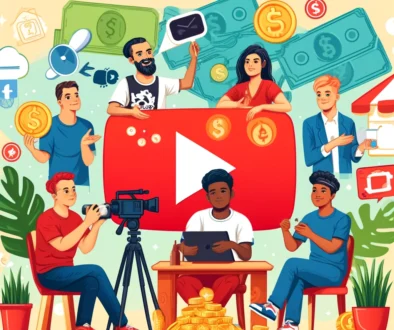2024’s Top 10 Innovative Online Money-Making Strategies
1. Mastering Micro-Influencing: Small Audience, Big Impact
 In the realm of digital marketing, the trend is shifting towards authenticity and niche targeting, making 2024 the year of the micro-influencer. Unlike their mega-influencer counterparts, micro-influencers boast smaller, yet highly engaged audiences. This presents a unique opportunity for bloggers to carve out their own space in the influencer market by focusing on specific niches or interests.
In the realm of digital marketing, the trend is shifting towards authenticity and niche targeting, making 2024 the year of the micro-influencer. Unlike their mega-influencer counterparts, micro-influencers boast smaller, yet highly engaged audiences. This presents a unique opportunity for bloggers to carve out their own space in the influencer market by focusing on specific niches or interests.
The key to success in micro-influencing lies in understanding your audience deeply and engaging with them on a personal level. This means regular interaction through comments, live sessions, and personalized content. The authenticity factor cannot be overstated; your followers need to feel a genuine connection and trust in your recommendations.
Monetization strategies for micro-influencers vary, ranging from affiliate marketing and sponsored content to selling digital products or services directly related to your niche. Brands are increasingly recognizing the value of partnering with influencers who have a direct line to highly targeted audiences, making this an opportune time to leverage your blog and social media presence.
To capitalize on this trend, focus on quality over quantity. Grow your audience organically by consistently delivering valuable content that resonates with your niche. Use analytics tools to understand your audience’s preferences and tailor your content strategy accordingly. Finally, network with brands and other influencers in your niche to expand your reach and discover new monetization opportunities.
2. Cryptocurrency Content Creation: Guide the Future of Finance

Cryptocurrency is not just transforming finance; it’s rewriting the rulebook on modern investment and wealth management. As we navigate into 2024, the digital currency landscape burgeons with opportunities, particularly in content creation. With the right approach, bloggers and digital content creators can position themselves as leading voices in this revolutionary field, guiding their audience through the complexities of blockchain technology, digital wallets, and the ever-evolving market trends.
Diving into cryptocurrency content creation requires a keen understanding of both the technical aspects and the market dynamics. The most successful creators in this niche are those who can break down intricate concepts like smart contracts, mining, and tokenomics into digestible, engaging content. Whether through blog posts, video tutorials, or podcasts, presenting information in a clear, accessible manner is key.
Moreover, staying ahead of trends is crucial. The crypto world is fast-paced, with new developments, coins, and technologies emerging regularly. By providing timely analysis and forecasts, content creators can become invaluable resources for both seasoned investors and newcomers eager to explore the digital finance frontier.
Engagement is another critical factor. Interactive content, such as Q&A sessions, webinars, and community discussions, fosters a sense of belonging among your audience. It not only aids in demystifying the subject but also builds trust, positioning you as a go-to expert in the field.
As we move further into the future of finance, the demand for insightful, reliable cryptocurrency content will only grow. For bloggers and digital creators, this presents a golden opportunity to carve out a niche in guiding readers through the exciting, sometimes tumultuous waters of cryptocurrency.
3. Niche Subscription Boxes: Curate and Capitalize

Niche subscription boxes continue to carve out significant spaces in the hearts and homes of consumers worldwide. This trend capitalizes on the allure of personalized, curated experiences delivered directly to doorsteps, offering a unique blend of convenience, discovery, and customization. For entrepreneurs and bloggers, this model presents an enticing opportunity to deep dive into specific interests or needs, creating a business that not only generates income but also builds a passionate community.
The key to success in the niche subscription box market lies in understanding and leveraging the unique characteristics of your target audience. Whether it’s gourmet international snacks for foodies, eco-friendly everyday products for the environmentally conscious, or rare comic books for collectors, the focus should be on quality and relevance. The goal is to deliver not just products but an experience that resonates with subscribers on a personal level, fostering loyalty and word-of-mouth promotion.
Moreover, the unboxing experience itself has become a pivotal aspect of the subscription box appeal. A thoughtfully designed package, with personalized touches and engaging content, can enhance customer satisfaction and encourage social media shares, further amplifying your brand’s reach.
For content creators, diving into the niche subscription box industry means not only curating products but also crafting stories around them. Engaging content that highlights the origins, uses, and value of the items can enrich the subscriber experience and solidify the connection between your brand and its audience.
4. Virtual Event Planning: Organize and Monetize

The realm of virtual event planning has evolved into a lucrative avenue for entrepreneurs and content creators alike. This digital frontier offers endless possibilities for organizing and monetizing events that cater to a global audience without the constraints of physical location. Virtual events span a diverse range of formats, from webinars and workshops to large-scale conferences and intimate masterclasses, allowing planners to tap into niche markets with tailored content.
The key to a successful virtual event lies in delivering value and engagement. By leveraging advanced streaming platforms, interactive tools, and social media integration, organizers can create immersive experiences that resonate with attendees. Engaging speakers, interactive sessions, and networking opportunities are vital components that enhance the virtual event experience, driving participation and satisfaction.
Monetization strategies for virtual events include ticket sales, sponsorship deals, and premium content access. Offering tiered ticket options provides flexibility for attendees, while sponsors looking to reach specific demographics find value in these digital gatherings. Additionally, recording the event and offering it as on-demand content can generate passive income long after the live event has concluded.
Embracing virtual event planning in 2024 means staying at the forefront of digital trends, understanding audience needs, and leveraging technology to create memorable, impactful experiences that not only captivate but also convert engagement into revenue.
5. Skill Sharing: Teach and Profit with Online Courses

The digital landscape for education continues to expand, offering unprecedented opportunities for skill sharing through online courses. This trend not only democratizes learning but also opens up lucrative avenues for experts across various fields to teach and profit. From programming and design to cooking and wellness, there’s a growing appetite for knowledge that transcends traditional classroom boundaries.
Creating an online course allows educators to reach a global audience, breaking down geographical barriers and connecting with learners eager for personalized educational experiences. The key to success in this arena lies in identifying unique skills or knowledge you possess and translating that into comprehensive, engaging online content. High-quality video lessons, interactive quizzes, and downloadable resources enhance the learning experience, making it more immersive and effective.
Monetization of online courses can be approached in multiple ways. Platforms like Udemy, Coursera, or Skillshare simplify the process by hosting courses and providing payment models based on subscriptions or one-time purchases. Alternatively, creating a dedicated website for your courses offers more control over branding and pricing, potentially increasing profit margins.
As we forge ahead, the importance of continuous learning and skill development cannot be overstated. By stepping into the role of an online educator, not only do you contribute to this culture of lifelong learning, but you also tap into a growing market with significant earning potential.
6. Green E-commerce: Sell Sustainable Products

green e-commerce has surged to the forefront of the digital marketplace, reflecting a global shift towards sustainability and environmental consciousness. Consumers are increasingly seeking products that not only meet their needs but also align with their values of reducing environmental impact. This demand has spurred the growth of online stores dedicated to selling sustainable products, from eco-friendly fashion and biodegradable packaging to renewable energy gadgets and organic food.
The success of green e-commerce hinges on transparency and authenticity. Businesses thriving in this space are those that go beyond just offering green products; they embed sustainability into every aspect of their operations, including supply chain management, packaging, and shipping. By leveraging digital platforms, these businesses educate and engage with their customers about the importance of sustainable living, creating a community around shared environmental goals.
Monetizing green e-commerce involves strategic branding and marketing that highlights the environmental and social benefits of the products. It also requires staying informed about the latest in sustainable technologies and consumer trends to continuously innovate and improve the eco-friendliness of the offerings.
As we navigate the future, green e-commerce represents not just a trend but a fundamental shift in how businesses operate and consumers shop, with the potential to make a significant positive impact on the planet.
5. Skill Sharing: Teach and Profit with Online Courses

The digital landscape for education continues to expand, offering unprecedented opportunities for skill sharing through online courses. This trend not only democratizes learning but also opens up lucrative avenues for experts across various fields to teach and profit. From programming and design to cooking and wellness, there’s a growing appetite for knowledge that transcends traditional classroom boundaries.
Creating an online course allows educators to reach a global audience, breaking down geographical barriers and connecting with learners eager for personalized educational experiences. The key to success in this arena lies in identifying unique skills or knowledge you possess and translating that into comprehensive, engaging online content. High-quality video lessons, interactive quizzes, and downloadable resources enhance the learning experience, making it more immersive and effective.
Monetization of online courses can be approached in multiple ways. Platforms like Udemy, Coursera, or Skillshare simplify the process by hosting courses and providing payment models based on subscriptions or one-time purchases. Alternatively, creating a dedicated website for your courses offers more control over branding and pricing, potentially increasing profit margins.
As we forge ahead, the importance of continuous learning and skill development cannot be overstated. By stepping into the role of an online educator, not only do you contribute to this culture of lifelong learning, but you also tap into a growing market with significant earning potential.



